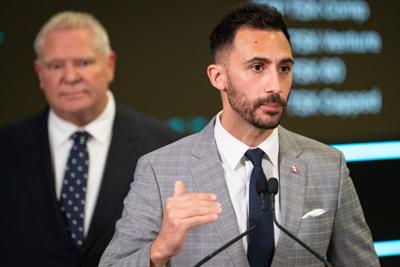Premier Doug Ford’s legislation fast-tracking infrastructure and mining projects violates long-standing First Nation treaty rights, endangers wildlife and could lead to unwilling hosts for garbage dumps, a parliamentary committee heard.
But proponents argue the Progressive Conservatives’ controversial Bill 5 is essential to helping Ontario’s economy weather the storm caused by U.S. President Donald Trump’s trade war with Canada.
In the first day of legislative hearings into the “Protect Ontario by Unleashing Our Economy Act,” MPPs were told the proposed law is necessary to expedite mining approvals, which can take to 15 years, and build new roads and highways.
“We need to ensure that we are not beholden to President Trump and when it comes to critical minerals or energy or even our waste management,” Energy and Mines Minister Stephen Lecce said Thursday.
That was a reference to the expansion of a landfill site in Dresden that has drawn the ire of local residents, including Tory MPPÂ Steve Pinsonneault (Lambton-Kent-Middlesex), who has spoken out against his government’s legislation that would allow a dump just 550 metres from a high school.
Lecce said Pinsonneault was “a strong advocate for his community, this is personal to him, he’s lived there his whole life.”
Chatham-Kent Mayor Darrin Canniff said the legislation was opening a can of worms that could impact communities around the province.
“If a massive landfill can be forced on the edge of our town without full environmental review, whose town is next?” said Canniff.
Because Ontario exports 40 per cent of its garbage stateside, the Tories fear the province’s waste-management system could be at the mercy of Trump’s whims.
The law, which would limit environmental assessments and create “special economic zones” exempt from many municipal and provincial rules, has infuriated Indigenous leaders.
“We are here to remind Ontario it has obligations under the treaty. You need to fulfil those obligations. We are not an interest group,” warned Grand Chief Alvin Fiddler of the Nishnawbe Aski Nation.
“Our treaty is not red tape. Our rights are not red tape,” said Fiddler.
During earlier testimony from Lecce and Indigenous Affairs and First Nations Economic Reconciliation Minister Greg Rickford, NDP MPP Sol Mamakwa said “you’re not listening to First Nations.”
“You’re not answering my question, you’re just blowing smoke,” Mamakwa (Kiiwetinoong) chided Rickford.
“Do you understand that with this bill you’re not honouring the treaties? You’re violating them,” he said.
Rickford said he disagreed that treaty rights were being broken with the legislation, which he argued would bring economic prosperity to many Indigenous communities by creating jobs and building infrastructure like roads.
Cynthia Fiddler, a band councillor at Sandy Lake First Nation, noted a defunct gold and silver mine dating back to 1939 has left her community polluted to this day.
“Fast-track the cleanup. Why can’t that be fast-tracked?” Fiddler told the committee.
“This is wrong, this bill.”
Testifying in Anishininiimowin, known in English as Oji-Cree, Sandy Lake lawyer Adam Fiddler stressed “our inherent right is sacred.”
The Tories used their majority on the committee to defeat Mamakwa’s motion to hold legislative hearings in the northern communities most affected by the potential changes.
As a smattering of protesters braved the rain outside, chanting “stop Bill 5,” Liberal MPP Jonathan Tsao (Don Valley North) said the scheme was “a reckless plan to override laws, silence consultation and fast-track development.”
However, Ontario Mining Association president Priya Tandon said “this bill’s key mining related elements are vital to enhancing Ontario’s economic competitiveness and unlocking the potential of its mineral sector.”
“The potential is transformational, but we need government in alignment with this end goal to make it a reality, particularly when we are in a geopolitical climate of uncertainty,” said Tandon.
“We are encouraged that this government has signalled its intention to strengthen Ontario’s economy at home,” she said.
“Our members produce the building blocks of modern life and innovation that the world needs.”
Dolf DeJong, chief executive officer of the º£½ÇÉçÇø¹ÙÍøZoo, expressed concern the legislation would endanger species.
“This bill, if passed, could undo decades of conservation efforts and threaten some of Ontario’s most vulnerable species, species your º£½ÇÉçÇø¹ÙÍøZoo works directly for — and these are species who can’t speak for themselves — including the Eastern Loggerhead Shrike, Blanding’s turtles, Massasauga rattlesnake, boreal caribou and more,” said DeJong.
“They’re living, breathing, parts of Ontario’s natural heritage and part of our identity. These are species we’ve been working for decades with communities, partners and governments of all stripes, including yours, to protect at your º£½ÇÉçÇø¹ÙÍøZoo.”
With files from Rob Ferguson
Error! Sorry, there was an error processing your request.
There was a problem with the recaptcha. Please try again.
You may unsubscribe at any time. By signing up, you agree to our and . This site is protected by reCAPTCHA and the Google and apply.
Want more of the latest from us? Sign up for more at our newsletter page.























To join the conversation set a first and last name in your user profile.
Sign in or register for free to join the Conversation